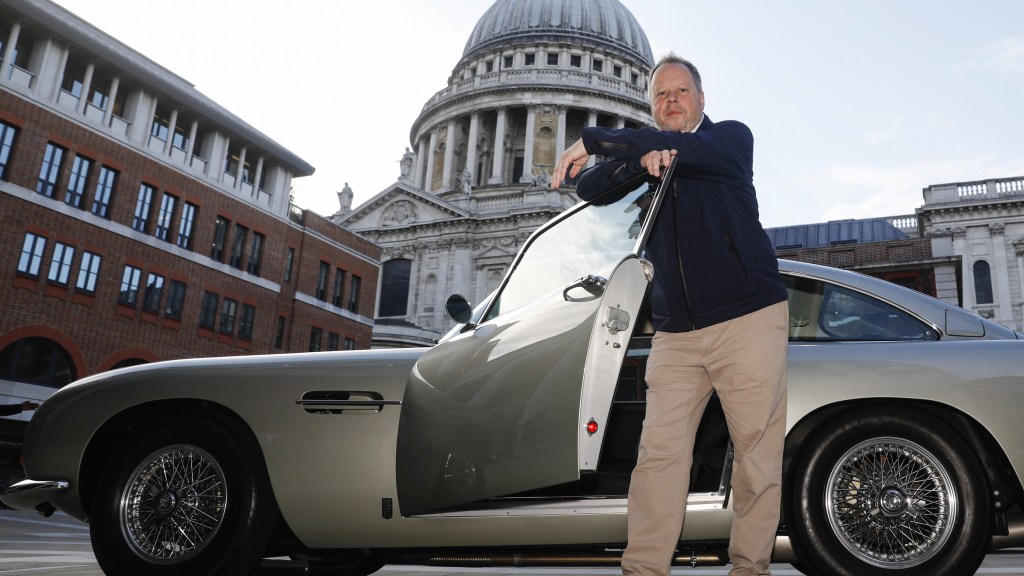UK Carmakers Prepare for Potential Impact of Trump Tariffs
In a speech at the MotorCity Casino hotel in Detroit, just a month ahead of the US presidential election, Donald Trump emphasized his intentions to boost the struggling American car industry by proposing extensive tariffs on vehicle imports.
During his address to the Detroit Economic Club on October 10, he stated, “Your car industry is going out of business. It’s going out of business,” highlighting his concern for the domestic automotive sector.
While Trump’s protectionist stance appears aimed at preventing China from flooding the US market with low-cost vehicles, UK car manufacturers could find themselves inadvertently affected by a broader trade conflict.
Britain hasn’t been the world’s leading auto producer since 1955, yet vehicles remain one of its major exports to the US. In the past year, British car exports to the US amounted to $6.7 billion out of a total of $72 billion in goods exported from the UK, according to the UN Comtrade database.
Many of the UK’s largest automakers, such as Nissan, Toyota, and Stellantis, operate plants in the US and would likely be exempt from tariffs. However, companies like Jaguar Land Rover (JLR), Aston Martin, Rolls-Royce, Bentley, McLaren, and Lotus manufacture cars in the UK and rely heavily on exports to the US market, placing them at risk from Trump’s proposed tariffs.
For these manufacturers, the US market is critical. JLR, for instance, generated approximately £6.5 billion from US sales out of a total of £29 billion for the fiscal year ending March 2024, significantly surpassing its sales figures from China and the UK.
Should the UK car industry be concerned? A representative from a UK carmaker expressed, “We’re not panicking yet.”
Trump first suggested implementing a blanket tariff in August of last year, stating on Fox News, “If they charge us, we charge them… I do like the 10 per cent for everybody.”
David Bailey, a Birmingham University business management professor, acknowledged the impact US tariffs would have on UK car manufacturers, asserting, “I think Trump will have to do it; he’s driven by blue-collar votes and the need to protect US industry, making it difficult for him to back down.”
Andy Palmer, the former CEO of Aston Martin and ex-operating chief of Nissan, remained optimistic, stressing that if the UK government advocates for exemptions from the proposed blanket tariffs, the situation could improve for UK manufacturers. He noted, “The saving grace for the UK is that the US is our largest export market. Trump’s tariffs appear targeted at nations with a trade surplus with the US, and fortunately, the UK’s trade balance is relatively stable.”
However, European car manufacturers such as BMW and Volkswagen could potentially navigate the situation more favorably than UK firms due to their production facilities in the US. BMW operates a large facility in South Carolina, while Volkswagen has its Chattanooga assembly plant in Tennessee. Additionally, although Renault does not own a factory in the US, its alliance with Nissan provides a competitive advantage.

Bailey indicated that larger European manufacturers might increase production in the US in response to tariffs, which places premium and luxury brands based in the UK at a disadvantage. He mentioned that JLR has long contemplated establishing a plant in the US, a decision that may gain urgency amid these tariff threats.
John Alty, a former interim permanent secretary at the Department for International Trade, pointed to past experiences, recalling that during Trump’s previous tariffs in 2019, the EU was settled with first, with the UK following later.
An additional concern is whether Trump would impose tariffs on Chinese-manufactured components used in British vehicles, including electric vehicle batteries, which are primarily produced in China before being shipped for assembly in the UK.
Trump has pledged to enact tougher tariffs on countries like China and India, which utilize protectionist economic strategies. With the election approaching, he promised tariffs as high as 60 percent on Chinese imports.
Bailey mentioned that if the US pursues such tariffs, the UK may face pressure to impose its own tariffs on Chinese imports in exchange for favorable terms from the US. This could lead to the UK adopting tariffs on Chinese electric vehicles, similar to measures the EU recently implemented.
Until Trump potentially returns to the presidency in January, UK carmakers remain hopeful while preparing for possible challenges. The recent news of Robert Lighthizer, the US trade representative during Trump’s first trade conflict with China, being considered for reappointment casts further uncertainty on future trade relations.
Nonetheless, Chancellor Rachel Reeves, during her recent testimony to the Treasury committee, seemed to dismiss the idea of imposing retaliatory tariffs if the US were to institute blanket import taxes.
During this time, Cabinet Office Minister Pat McFadden hinted that Trump might not follow through on his threats, suggesting the president-elect has a history of making bold statements.
Should the anticipated Trump tariffs materialize, the looming concern is that they could instigate a global trade conflict. Palmer cautioned, “If other nations retaliate with tariffs, it could adversely affect the UK’s trade with Europe and Asia.”
He further remarked, “The UK’s limited manufacturing capacity makes us vulnerable as we rely heavily on imported materials for vehicle production, which could significantly escalate manufacturing costs in an already struggling industry.”




Post Comment